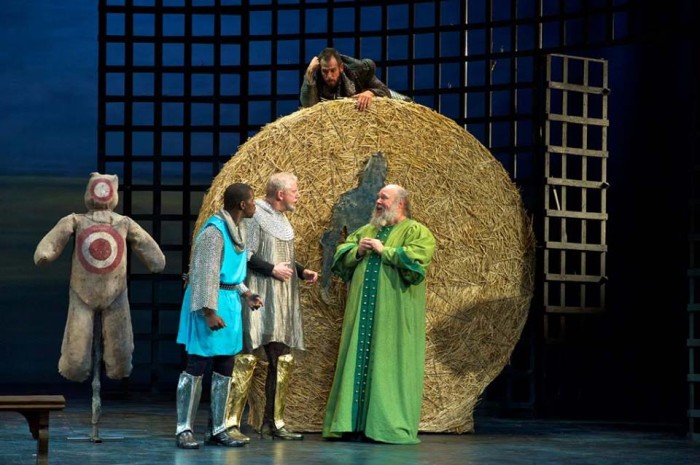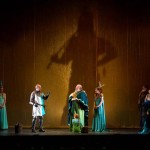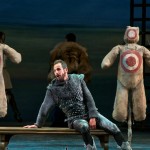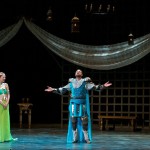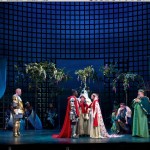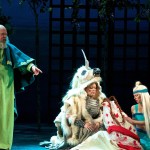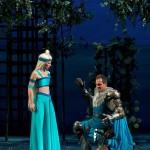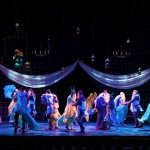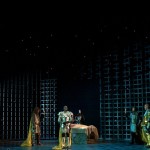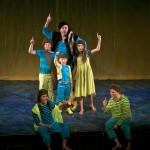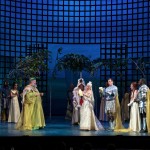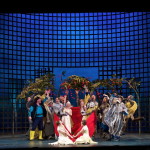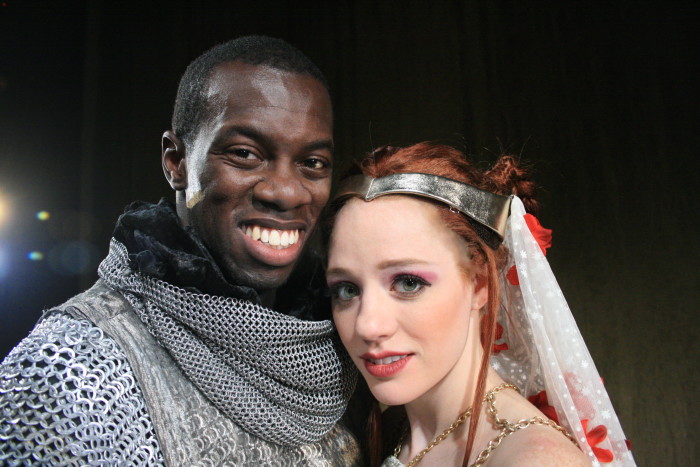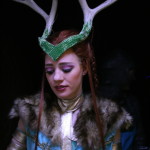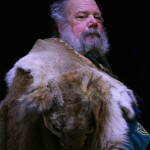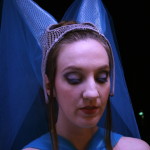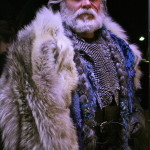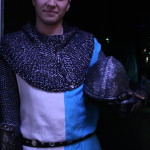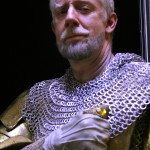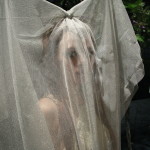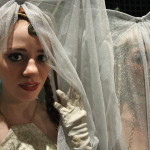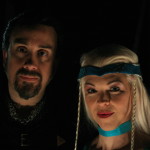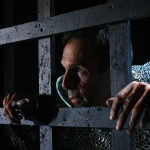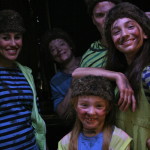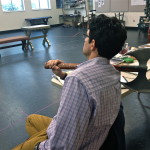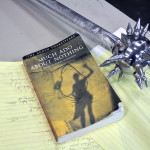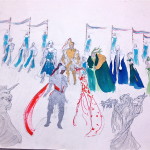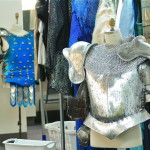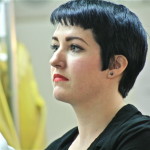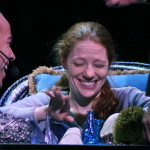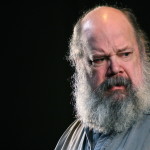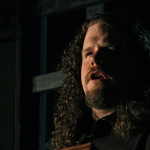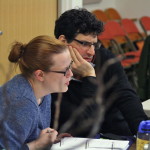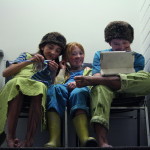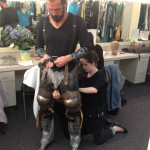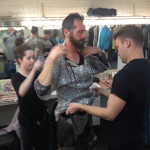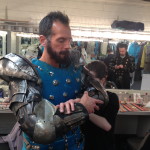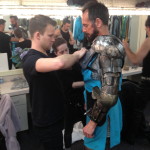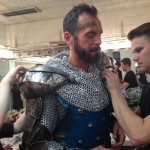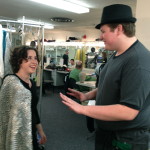Photos above by Alexander I. Weisman
Photos below by the Hinge Collective
Top: Terrell Donnell Sledge and Ashley Wickett.
Row 1: Ashley Wickett; Colleen Baum; John Ahlin.
Row 2: T. Ryder Smith; Terrell Donnell Sledge; Marza Warsinske.
Row 3: Terence Goodman; Miles Romney; Bryce Peterson.
Row 4: David Manis; Marcella Pereda; T. Ryder Smith.
Row 5: Terrell Donnell Sledge; Ashely Wickett; Ashley Wickett and Rebecca Watson.
Row 6: Christopher DuVal and Rebecca Watson; T. Ryder Smith; Marcella Pereda, Brigham Inkley, Mia Bagley, Bryce Peterson, Zoe Heiden.
Row 7: Knights Bryce Peterson, Austin Archer, Alex Elzroth and Amos Omer; Colleen Baum.
Excerpts from the reviews
Full reviews are below
“Even if you’re intimately familiar with Much Ado, there is plenty to love in this creative adaptation by director Matt August, from several excellent performances and new twists on old dialogue, to the stunning set design and costumes. . . . August sets the tale in the late Middle Ages, and the music by composer Scott Killian and ornate costumes by Elizabeth Caitlin Ward–a veteran of projects around the globe, including the opening ceremonies of the Beijing Olympics–immediately evoke the era. A striking, sparse set of metal, candles and flowing fabrics makes for an engaging space for characters adorned in armor, fur and gauzy robes to tell their story. . . . The story remains a winning one–all the more so in the capable hands of August’s cast. Benedick (T. Ryder Smith) and Beatrice (Rebecca Watson) jab and jive through numerous bouts of verbal sparring as the two jaded non-romantics set up as juxtaposition to the passionate youngsters Claudio and Hero . . . Smith and Watson often steal the scene whenever they are on stage, delivering confident performances. . . . August’s gamble on placing his Much Ado in the Middle Ages pays off. For both audience and performers, the twist makes the show feel new . . .” Dan Nailen, SaltLakeMagazine.com
“Director Matt August has successfully created a fantasy world where a plot prizing chivalry, honor, virtue, and virginity can authentically play out without seeming antiquated. . . . The look is a Technicolor version of Game of Thrones—time out of time—where armor is needed and women defying gender roles (as Beatrice does) is both charmingly tolerated and slightly disturbing. I was pleased to see that Beatrice’s contrary (by Elizabethan standards) nature was not just a “bitchy” character trait, but an active rebellion against the standards of the society in which she existed. . . . Rebecca Watson as Beatrice and T. Ryder Smith as Benedick shine as the unlikely lovers, exchanging barbs and decrying marriage at every turn. They are exactly what these two should be: a little older, a little wiser, and a little warier of “happily ever after.” . . . Their chemistry is clear . . . Benedick’s transformation from rough-and-tumble knight to love-sick gentleman is beauteous, while Beatrice’s softening from Amazonian independence to emotional vulnerability is delicate and slightly bittersweet. The whole scope of the duo’s complicated relationship is portrayed in two funny yet poignant scenes . . . ” Megan Crivello, UtahTheatreBloggers.com
“Effervescent and infectiously enjoyable . . . The company illuminates Shakespeare’s brilliant comedic repartee while commendably balancing the more serious reflections on honor and shame. . . . The on-again, off-again love affair between Beatrice and Benedick (delightfully played by Rebecca Watson and T. Ryder Smith) sizzles. . . . Elizabeth Caitlin Ward’s whimsical costumes and James Noone’s scenic design subtly suggesting a spiderweb make it a visual treat, too. . . .” Blair Howell, Deseret News
“’Much Ado’ depends on balance: the witty, romantic rivalry of the mature Beatrice and Benedick counterpointing the youthful ardor and naïveté of Hero and Claudio; the slapstick comedy of Dogberry and his cohorts undercutting the tragic overtones of Don John’s plot and Hero’s betrayal. Except in rare moments in the 2nd act where Beatrice and Benedick reveal the deep desire for connection under their bravado, this production never finds that equilibrium . . . “ Barbara M. Bannon, Salt Lake Tribune
“It was refreshing to hear actors fill the space with their voices, rather than rely on microphones . . . Beatrice was played with feisty independence and gravity by Rebecca Watson. T. Ryder Smith’s Benedick was singularly juvenile and aged at the same time . . . “ Eve Speer, AllAboutEvey blog
Rehearsals and offstage
Top row: Director Matt August watching rehearsal; Matt trying on chain mail; script and mace.
Row 2: Costume renderings; costume designer Elizabeth Caitlin Ward; costumes being assembled.
Row 3: cast members John Ahlin; Mia Bagley; Ashley Wickett.
Row 4: cast members Zoe Heiden; Max Robinson and Colleen Baum; dresser Amanda Andrews.
Row 5: cast member Amos Omer; Max Robinson and John Ahlin pretending they are in “Waiting for Godot”; Terrence Goodman.
Row 6: cast members Mia Bagley, Zoe Heiden and Brigham Inkley; ASM Bryan Sommer and Ashley Wickett in tech; John Ahlin rehearses.
Row 7: Miles David Romney, exceptional counter-tenor; PSM Mary Costello and director Matt August; Brigham Inkley in tech.
Row 8: the kids backstage; teching shadows; teching flags.
Rows 9 and 10: Getting me into my armor. It was almost entirely metal and weighed 61 pounds. I wore it through most of the show. And danced in it. Twice.
Row 10 and 11: my wonderful, unflaggingly helpful and fun dressers: Gregory Neff, Juliet Demars, and Daniel Streed (in hat); my old-school crepe-hair beard, built nightly.
Full reviews
Salt Lake Magazine, Dan Nailen – The Bard Revisited. There are those who accuse fans of The Bard for constantly making much ado about William Shakespeare’s works, but those folks are missing out, especially when the playwright delves into comedy.
Case in point: Pioneer Theatre Company’s new production of Much Ado About Nothing, one of Shakespeare’s most recognizable, oft-performed comedies. Even if you’re intimately familiar with Much Ado, there is plenty to love in this creative adaptation by director Matt August, from several excellent performances and new twists on old dialogue, to the stunning set design and costumes.
August sets the tale in the late Middle Ages, and the music by composer Scott Killian and ornate costumes by Elizabeth Caitlin Ward–a veteran of projects around the globe, including the opening ceremonies of the Beijing Olympics–immediately evoke the era. A striking, sparse set of metal, candles and flowing fabrics makes for an engaging space for characters adorned in armor, fur and gauzy robes to tell their story.
The story remains a winning one–all the more so in the capable hands of August’s cast. Benedick (T. Ryder Smith) and Beatrice (Rebecca Watson) jab and jive through numerous bouts of verbal sparring as the two jaded non-romantics set up as juxtaposition to the passionate youngsters Claudio (Terrell Donnell Sledge) and Hero (Ashley Wickett). Smith and Watson often steal the scene whenever they are on stage, delivering confident performances. Sledge was a bit more reticent in running through Shakespeare’s dialogue, but Wickett picked up the slack in that coupling.
Among the other noteworthy performances are John Ahlin as Leonato, Hero’s father, David Manis as Don Pedro, the returning military commander who enjoys a bit of fun at Benedick’s expense, and Max Robinson as Dogberry, the town constable who in this version leads a band of children.
The mix of stinging one-liners, mistaken identities and comedic comeuppances, while familiar, come through as fresh in Pioneer’s production. August’s gamble on placing his Much Ado in the Middle Ages pays off. For both audience and performers, the twist makes the show feel new–no easy task with such well-worn source material.
2.24.14
Salt Lake Tribune, Barbara M. Bannon – Pioneer Theatre Company’s reinvention of ‘Much Ado About Nothing’ misfires. Production is a combination of too much and too little. I’m not a Shakespeare purist. I’ve reviewed productions set in a variety of times and places, including a “Twelfth Night” that unfolded in a cyber café, and thought they worked fine. So the idea of Pioneer Theatre Company’s current production of “Much Ado About Nothing” taking place in the Arthurian Middle Ages didn’t sound alarming.
But any production that reimagines Shakespeare — in fact, any production at all — needs two things: a consistent vision and respect for the playwright’s text. Unfortunately, this production struggles with both. There are some fine performances, and the second act becomes more grounded and focused, but that’s largely too little and too late.
Inconsistent tone and mismatched performances undermine the effectiveness of PTC’s production.
The first problem is that director Matt August’s direction in the first act is so over-the-top, especially in the parallel Benedick and Beatrice eavesdropping scenes, that it feels as if he is making fun of Shakespeare. His touch in the second act is more restrained, and consequently it moves much better.
The most consistent thing about this production is its inconsistency. Elizabeth Caitlin Ward’s costumes are just one example. The men wear fur or suits of armor while Beatrice and Hero have stylish, but very skimpy, dresses that look decidedly New Age. Leonato and Hero’s antlers and the Master’s white fur cape with its giant unicorn’s head provide a touch of fantasy, but other costumes, especially the children’s, look realistic and contemporary. The result is a hodgepodge of styles that distract from the play.
The blue motif for costumes and banners is a nice touch, and James Noone’s set and Paul Miller’s lighting create some striking images, especially the flickering orange lights of the tomb scene and the flower-decked arbor at the wedding. The use of candlelight throughout is lovely, but the men’s bath scene is totally anachronistic.
The performances are equally inconsistent. T. Ryder Smith’s Benedick is quick and clever and interacts playfully with the audience, but Rebecca Watson’s Beatrice delivers her lines like a stand-up comic waiting for the laughs, and her barbs seem bitter and spiteful. Not that you hear many of her lines: She speaks so fast that you miss them.
Ashley Wickett plays Hero like a silly, simpering schoolgirl. John Ahlin (Leonato), David Manis (Don Pedro), Christopher DuVal (Don John) and Terence Goodman (Antonio) offer strong support, and Terrell Donnell Sledge creates an earnest, impetuous Claudio.
Max Robinson is appropriately outrageous as Dogberry, unerringly sensing just how far to push the character. August’s casting children as the members of the watch is intriguing, although you can’t always understand them. Tobin Atkinson and Michael Dozier are alternately funny and vindictive as Borachio and Conrade, and Colleen Baum is an eloquent voice of reason as the Master. But why does Miles David Romney’s Balthazar wander through all the scenes singing?
“Much Ado About Nothing” depends on balance: the witty, romantic rivalry of the mature Beatrice and Benedick counterpointing the youthful ardor and naïveté of Hero and Claudio; the slapstick comedy of Dogberry and his cohorts undercutting the tragic overtones of Don John’s plot and Hero’s betrayal. Except in rare moments in the second act where Beatrice and Benedick reveal the deep desire for connection under their bravado, this production never finds that equilibrium.
2.26.14
Deseret News, Blair Howell – Pioneer Theatre Company’s “Much Ado About Nothing” is so effervescent and infectiously enjoyable that it very nearly snaps, crackles and pops.
The company illuminates Shakespeare’s brilliant comedic repartee while commendably balancing the more serious reflections on honor and shame.
The on-again, off-again love affair between Beatrice and Benedick (delightfully played by Rebecca Watson and T. Ryder Smith) sizzles. It reminds why some consider “Much Ado” the precursor to the romantic screwball comedies of the 1930s. The sworn enemies who spar eagerly each time they meet and swear they will never fall in love have parallels, for example, in the Clark Gable and Claudette Colbert characters in “It Happened One Night.”
What makes “Much Ado” fascinatingly unique is that it’s both comedy and tragedy. The enfolding comedy of the Beatrice-Benedick story is set against a darker one of younger love between Claudio and Hero (Terrell Donnell Sledge and Ashley Wickett, both excellent). Hero is wrongly accused of being unchaste and nearly brought to death, and their relationship is threatened by the machinations of the Don John (a malicious Christopher DuVal).
The diabolical plotting of Don John and his henchmen is uncovered by the buffoonish civil servant Dogberry and his “men.” These scenes find counterparts in movies featuring the Keystone Kops.
And spoiler alert: The story ends with happy marriages — and no deaths!
As he envisioned, the immensely talented Matt August has made Shakespeare cool.
Through his sprightly direction, the audience is easily engaged in the story and keeps the atmosphere from becoming overly jovial that it would detract from the sadder, more poignant aspects.
This production’s appeal undeniably stems from its performances, where the director focuses his strongest attention. Yet Elizabeth Caitlin Ward’s whimsical costumes and James Noone’s scenic design subtly suggesting a spider web make it a visual treat, too. There are multiple vibrant shades from peacock blue to a delicate celery green seen in the Elizabethan pageantry-inspired wardrobe that is embellished with silver and gold accents, then layered with animal pelts.
As noted, the acting is universally strong. Deserving mention is Max Robinson’s carefree delivery of Dogberry’s malapropisms. And casting youth actors, Mia Bagley, Zoe Heiden and Brigham Inkley, as the bumbling Night Watchmen was a decision that adds to the gaiety.
“Much Ado” is an excellent introduction to Shakespeare’s work, because its joyful comedy makes the play so accessible. Both Shakespeare veterans and Shakespeare amateurs will delight in this expert PTC production.
2.25.14
All About Evey blog, Eve Speer – Friday night, I joined my friend Blair Howell to see Pioneer Theater Company’s out-of-time production of Much Ado About Nothing.
I was delighted with the universe–the design concepts helped to highlight the characters’ journeys, rather than fight against them. Often times, I find myself pulled in two creative directions–distracted by the world of the play. While the design was exciting, it contributed to the story and helped us to see Beatrice’s independence, Hero’s grace, and reminded us that Messina was a land on the edge of war, with all the pomp and rigor that comes when you live as soldiers, with soldiers. This production chose to highlight this by reminding audiences that it was the very old and the very young who would have stayed out of the wars and participated in the night watch. And so the night watch made up of a grandfather (Max Robinson) and his fierce collection of grandguards.
The grid patterned set protected us from the warring outside world–while letting in the softly lit sky designed by Paul Miller. The whole world was a match of soft and harsh. Love and War. Honor and deception. Independence and vulnerability. Blues and yellows. (Thank you costume designer Elizabeth Caitlin Ward.)
It was refreshing to hear unmiked actors fill the space with their voices, rather than rely on microphones. At the top of the show, it seemed that the actors were more interested in simply cheating out with their speeches, rather than including the audience in the conversation. You know what I mean–dramatically looking out over the tops of the audience members without any acknowledgement of their existence. But finally, during Act 2–Claudio and Benedick are both alone and they turn and talk directly to the audience, rather than over our heads. I sighed. These soliliquies just make more sense when the audience is included, rather than ignored. From that point on, it seemed that conversations and speeches were more about communicating needs rather than just posturing.
Beatrice was played with feisty independence and gravity by Rebecca Watson. T. Ryder Smith’s Benedick was singularly juvenile and aged at the same time. He enjoyed the world he lived in while he was single and embraced the new world of love as an eager new student. His poetry was bad, but his heart was as charged in this new challenge as it had been when he was fighting as a soldier. Then again, falling in love with Beatrice couldn’t have been too different from fighting in a great battle.
As love and war meshed together, we saw glimmers of green in the costumes. The iron grid set gave way to ripening vines as the play progressed. Colleen Baum gave a comical and magical performance. More comedic with a touch of magic in the first act–and more magical, but still with a smile of humor in the second act.
I appreciated Matt August’s insistence on carrying the humor through the heartwrenching scenes as well. It allowed the audience to enjoy the gravity, rather than endure it. This was especially enjoyable when Leonato (John Ahlin) and his brother Antonio (Terence Goodman) threaten the offending Claudio (Terrell Donnell Sledge) and Don Pedro (David Manis).
Overall, it was a stunning production where the actors and the designers were able to compliment their gifts and create a cohesive and merry storytelling.
2.25.14
Daily Utah Chronicle, Shawna Meyer – PTC puts a refreshing twist on ‘Much Ado’. Thanks to the hilarious battle of wits between Benedick and Beatrice and the overabundance of rumor-filled lines, “Much Ado About Nothing” has become one of Shakespeare’s most beloved comedies. To no surprise, companies have performed the story many times over. Though some may call it tiresome, Pioneer Theatre Company has managed to rework the play in a creative way.
“There is always going to be something special and unique about each individual actor and what they bring to a role,” said Ashley Wickett, who plays Hero. “These words have been recited and spoken so many times, but what I find [in Hero] is going to be different than what any other actor has found.”
Recreating the world of Shakespeare’s familiar characters requires a lot of time and imagination, and director Matt August accomplished such a feat with a fantastical interpretation and a wonderfully talented cast.
When the curtains of “Much Ado About Nothing” open, costume designer Elizabeth Caitlin Ward’s wardrobe immediately transports viewers to medieval times. For the first scene, John Ahlin (Leonato) and Terence Goodman (Antonio) wear animal pelts, and Wickett dons a unique headpiece made of long and twisted horns. The lords enter the scene in chain mail and armor, while the ladies are bedecked in flowing gowns made of bright teal and yellow fabrics.
Ward has designed costumes for productions all over the world, including the closing ceremony for the 2008 Summer Olympic Games in Beijing. The costumes for “Much Ado About Nothing” are whimsical and mesmerizing and give the play an aesthetic appeal.
“Matt August has created a world that is bold and fantastical, magical and regal. When he mentioned that his inspiration was ‘Game of Thrones’ meets Disney princesses, I knew this was going to be exciting and different,” Wickett said.
Placing characters in the Middle Ages works well for a play concerned with chivalry, virtuosity and monarchial power. The importance of these virtues are heightened by the setting, costumes and, most importantly, the characters’ actions.
An old adage claims, ‘There is a thin line between love and hate.’ No fictional couple proves this better than Benedick and Beatrice. At first, the two swear they will never marry, and they take every opportunity to hurl verbal barbs at one another — of course, these insults only mask their true feelings.
T. Ryder Smith, who plays Benedick, delivers an entertaining performance brimming with good-humored sarcasm and hyperbolic speeches. The scene where Benedick overhears Leonato, Don Pedro and Claudio discussing Beatrice’s rumored love is one of the funniest in the play. Leonato’s attempt to play it cool encourages laughter from the audience, and the scene ultimately ends with Benedick hiding in plain sight under a bench.
From accurate portrayals of the play’s male personalities to the mesmerizing renditions of their female counterparts, PTC showcases a talented cast. Rebecca Watson (Beatrice) brings to life the play’s most complex character. Watson’s version of Beatrice is not just cynical and feisty, but she also lets Beatrice’s fear of looking like a lovesick fool shine through. This balance of strength and vulnerability is difficult to maintain, and Watson manages it with grace.
Max Robinson, a veteran actor at the Pioneer Theatre Company, is sure to earn applause for his hysterical role as Dogberry, the self-proclaimed master constable.
While “Much Ado About Nothing” is a play ultimately about love, there is also a strong emphasis on rumors and misunderstandings. For example, Don Pedro disguises himself in order to woo Hero in Claudio’s name, Hero is almost ruined by a falsity and both Benedick and Beatrice fall in love because their friends stretch the truth.
“Loving is one of the scariest things we do. We spend lifetimes learning how to protect ourselves from pain. [I think] that the disguises and rumors make taking the risk seem a little safer,” said Terrell Donnell Sledge, the actor playing Claudio.
2.24.14
Utah Theatre Bloggers.com, Megan Crivello – Fall in love with PTC’s “Much Ado”. Shakespeare is hard to sell. Any director approaching a production of a Shakespeare play is faced with serious obstacles like making the story clear, relevant, and interesting to an audience that may have seen the same story two or three times before. Walking in to Pioneer Theatre Company’s Much Ado About Nothing, I was afraid that it was going to be a “bold reimagining” that would be trying too hard to overcome these obstacles. I was pleasantly surprised.
For those who don’t know, Much Ado is a comedy about love, perception, and morality that centers on two sets of lovers, Hero and Claudio (who are innocent and genuine) and Beatrice and Benedick (who are independent and slightly jaded). Director Matt August has successfully created a fantasy world where a plot prizing chivalry, honor, virtue, and virginity can authentically play out without seeming antiquated. The look is a Technicolor version of Game of Thrones—time out of time—where armor is needed and women defying gender roles (as Beatrice does) is both charmingly tolerated and slightly disturbing. I was pleased to see that Beatrice’s contrary (by Elizabethan standards) nature was not just a “bitchy” character trait, but an active rebellion against the standards of the society in which she existed. Rebecca Watson as Beatrice and T. Ryder Smith as Benedick shine as the unlikely lovers, exchanging barbs and decrying marriage at every turn. They are exactly what these two should be: a little older, a little wiser, and a little warier of “happily ever after.” Their chemistry is clear, but the two actors are strongest during the scenes where they are overhearing the other’s love for them. Benedick’s transformation from rough-and-tumble knight to love-sick gentleman is beauteous, while Beatrice’s softening from Amazonian independence to emotional vulnerability is delicate and slightly bittersweet. The whole scope of the duo’s complicated relationship is portrayed in those two funny yet poignant scenes.
Equally strong are Terrell Donnell Sledge as Claudio and Ashley Wickett as Hero. These young lovers are the antithesis of Beatrice and Benedick: all sighs and hope and romance. It is very easy for these characters to become lighter versions of Romeo and Juliet—lacking substance and maturity. Yet Sledge and Wickett depict the rush and optimism of new love with genuineness while still keeping the young lovers three dimensional.
Both love stories are bolstered by an excellent supporting cast. Supporting characters in a Shakespeare play can easily turn stock and boring, with little to do but recite the lines while the lovers frolic. Fortunately, this world and August’s direction included rich characterizations that serve the story, not just mechanically move it along. John Ahlin, as Hero’s father Leonato, is by turns regal in his robes and furs and delightfully animated while playacting to convince Benedick that Beatrice loves him. Colleen Baum serves double duty as an adorably vacant gentlewoman and then a wise and earthy (and spectacularly adorned) Mystic who officiates over the requisite weddings. David Manis as the prince and military leader Don Pedro provides authority and gravitas but playfully meddles in the love lives of those who serve him.
The villain of Much Ado is the hardest to get right. Don John, the prince’s morose and slightly evil brother, is often flat. But Christopher DuVal gives John’s machinations to ruin Claudio and Hero’s happiness sophistication and roots his villainy in intellectual superiority and a lack of recognition rather than pettiness. John’s cohorts Borachio (Tobin Atkinson) and Conrad (Michael Jean Dozier) show the rougher side of being in the prince’s service: that not everything is valor and knightly duty and sometimes it’s just more fun being a little naughty. Atkinson is especially good at making the plot to ruin Hero clear. It is more of a job or a prank than a malicious act, and when it goes bad, Borachio is sincerely sorry for the hurt he has caused.
The performances and light tone make this production thoroughly enjoyable. The set by Jamesa Noone creates a vast and fanciful world that grounds the action of the play. Paul Miller’s lights, Scott Killian’s score, Joshua C. Hight’s sound design, and Amanda French’s hair and make-up design all layer lushness to create a truly memorable theatrical experience.
As much as I enjoyed the production, there are three things I struggled with almost to distraction. The first was the confounding use of a countertenor as the musician of the piece. Shakespearean comedies often have songs as part of the text and productions vary on how to deal with them. August presents them as high-pitched warbled ballads and easy jokes. The tone and quality of Miles David Romney’s voice cannot be denied, but this version of the character of Balthazar was unclear (in both purpose and words) and repetitive. My second struggle came with the treatment of the characters of Dogberry and the watch. Dogberry is like the town warden, and his main attribute is his mismanagement of language. Max Robinson is always appealing on stage and is more than capable of delivering Dogberry’s malapropisms with endearment. I felt that the humor was lost with what appeared to be an after-thought choice of using children as the watch and that this turned Dogberry into a shade of Fagin, rather than a man of the law. Finally, I struggled with the costumes designed by Elizabeth Caitlin Ward. While the armor, mythic furs, and robes that gave this world its fantasy vibe were impressive and beautifully crafted, there was a lack of connection between genders and classes. This was clearest in the jarring juxtaposition of Leonato in embroidered floor length robes and Dogberry in a dirt caked henley and yellow galoshes. It also felt as if the actors were acting around the costumes rather than with them, something that detracted considerable from the performance for me.
My struggles aside, the opening night audience was warm and receptive, laughing often and buzzing positively at intermission. Readers should be aware that the play does run close to two hours and forty minutes with intermission and parking is heavily impacted by construction on the new law library.
2.24.14
Cliff’s Music Picks blog, Clifford King – A lavish production. Much Ado About Nothing relates the stories of two pairs of lovers as they court one another. Through mistaken identity, confusion, deception, humor, and compassion, the couples end up happily together. The main couple, originally, were Claudio and Hero, but quickly the secondary couple, Benedick and Beatrice became more popular for audiences and steal the spotlight with their witty banter and interesting dynamic. Just like how historically Benedick and Beatrice steal the show, it was the same with PTC’s production. Exceptionally well-played by Rebecca Watson and T. Ryder Smith, Beatrice and Benedick (respectively) are extremely gifted actors with the dramatic sense and comedic timing of the Shakespearian texts of true professionals. For two commonly enjoyed characters of this play, they added an extra spark and depth beyond most productions that not only made us treasure every moment they were on stage.
While the whole cast was excellent, even above par of other PTC productions (which are dependably very fine performances), Max Robinson as Dogberry stood out. Offering laugh-out-loud comedic relief, Robinson is extremely dedicated to his craft and his character leaving the audience dying to find out when Dogberry would make his next hilarious appearance. David Manis, John Ahlin, and Terence Goodman, as scheming paternal figures in the capers were all excellent. Their comedic timing and chemistry was a delight to watch, particularly in a scene where they create a plot to trick Benedick, knowing full-well that he is listening in. They had the audience heartily laughing.
Designed byElizabeth Caitlin Ward, using a base yet intriguing color palate, the costumes of the production were both lavish and whimsical, referencing such styles and cultures of the ever popular “Game of Thrones” television show and even referencing A Midsummer’s Night Dream. Equally exquisite was the set, designed by James Noone (who also designed the set to A Few Good Men earlier this season) that was epic in its simplicity, yet infinite in its possibilities that were surely used as completely as any imagination could foster.
Director Matt August created an unforgettable rendition of this classic Shakespearian comedy that will not be soon forgotten: creative as can be and impeccably produced. Another home-run for Pioneer Theater Company.
Salt Lake City: City Weekly, Scott Renshaw – Most people think about Shakespeare in terms of the Bard’s language; it becomes easy to consider productions as collections of famous quotes and quips. Matt August’s direction of Much Ado About Nothing offers a reminder that they can provide just as rich a playground for slapstick.
The premise involves material that would easily find a home in one of Shakespeare’s tragedies, as the noble lord Claudio (Terrell Donnell Sledge) is deceived by Don John (Christopher DuVal)—the bastard brother of his patron, Don Pedro (David Manis)— into believing that his betrothed, Hero (Ashley Wickett), has been unfaithful. But the jealousy and accusations of harlotry are framed by the war of words between Claudio’s friend Benedick (T. Ryder Smith) and Hero’s cousin Beatrice (Rebecca Watson), both of whom insist that they will never find happiness in a marriage.
The juicy comedy emerges when Don Pedro, Claudio and Hero’s father, Leonato (John Ahlin) fool Benedick into believing that Beatrice loves him, while Hero and Ursula (Colleen Baum) attempt a similar deception with Beatrice about Benedick’s affections. The scenes are hilariously staged, with Smith skittering around the stage as Benedick attempts to remain hidden, and Ahlin magnificently exaggerating his report of Beatrice’s feelings. And Smith and Watson may be even better when tying their bodies into knots as Beatrice and Benedick try to convince themselves they’re not falling in love. Throw in the inept constable Dogberry (Max Robinson) and his “watch” composed of children, and this Much Ado feels as much like giddily choreographed silent-screen humor as it does highbrow thee-ay-tuh.
The comedy is so delightful, in fact, that Claudio’s bitter wedding-day accusations feel even more jarring. Much Ado gets much more serious than some of Shakespeare’s other comedies, which can put a damper on the spirited fun. The harsh words in this version are much more engaging when delivered with a wink and a touché.
[previous] [next]
